- Home
- Elif Shafak
The Bastard of Istanbul
The Bastard of Istanbul Read online
The Bastard of Istanbul
Elif Shafak
Twenty years later, Asya Kazanci lives with her extended family in Istanbul. Due to a mysterious family curse, all the Kazanci men die in their early forties, so it is a house of women, among them Asya's beautiful, rebellious mother Zeliha, who runs a tattoo parlour; Banu, who has newly discovered herself as a clairvoyant; and Feride, a hypochondriac obsessed with impending disatstr. And when Asya's Armenian-American cousin Armanoush comes to stay, long-hidden family secrets connected with Turkey's turbulent past begin to emerge.
Elif Shafak is one of Turkey's most acclaimed and outspoken novelists. She was born in 1971 and is the author of six novels, most recently The Saint of Incipient Insanities, The Gaze and The Flea Palace, and one work of non-fiction. She teaches at the University of Arizona and divides her time between the US and Istanbul.
THE BASTARD OF ISTANBUL
TO Eyup and Ehrazat Zelda
Once there was; once there wasn't.
God's creatures were as plentiful as grains And talking too much was a sin….
— The preamble to a Turkish tale… and to an Armenian one
ONE
Cinnamon
Whatever falls from the sky above, thou shall not curse it. That includes the rain.
No matter what might pour down, no matter how heavy the cloudburst or how icy the sleet, you should never ever utter profanities against whatever the heavens might have in store for us. Everybody knows this. And that includes Zeliha.
Yet, there she was on this first Friday of July, walking on a sidewalk that flowed next to hopelessly clogged traffic; rushing to an appointment she was now late for, swearing like a trooper, hissing one profanity after another at the broken pavement stones, at her high heels, at the man stalking her, at each and every driver who honked frantically when it was an urban fact that clamor had no effect on unclogging traffic, at the whole Ottoman dynasty for once upon a time conquering the city of Constantinople, and then sticking by its mistake, and yes, at the rain… this damn summer rain.
Rain is an agony here. In other parts of the world, a downpour will in all likelihood come as a boon for nearly everyone and everything-good for the crops, good for the fauna and the flora, and with an extra splash of romanticism, good for lovers. Not so in Istanbul though. Rain, for us, isn't necessarily about getting wet. It's not about getting dirty even. If anything, it's about getting angry. It's mud and chaos and rage, as if we didn't have enough of each already. And struggle. It's always about struggle. Like kittens thrown into a bucketful of water, all ten million of us put up a futile fight against the drops. It can't be said that we are completely alone in this scuffle, for the streets too are in on it, with their antediluvian names stenciled on tin placards, and the tombstones of so many saints scattered in all directions, the piles of garbage that wait on almost every comer, the hideously huge construction pits soon to be turned into glitzy, modem buildings, and the seagulls…. It angers us all when the sky opens and spits on our heads.
But then, as the final drops reach the ground and many more perch unsteadily on the now dustless leaves, at that unprotected moment, when you are not quite sure that it has finally ceased raining, and neither is the rain itself, in that very interstice, everything becomes serene. For one long minute, the sky seems to apologize for the mess she has left us in. And we, with driblets still in our hair, slush in our cuffs, and dreariness in our gaze, stare back at the sky, now a lighter shade of cerulean and clearer than ever. We look up and can't help smiling back. We forgive her; we always do.
At the moment, however, it was still pouring and Zeliha had little, if any, forgiveness in her heart. She did not have an umbrella, for she had promised herself that if she was enough of an imbecile to throw a bunch of money to yet another street vendor for yet another umbrella, only to forget it here and there as soon as the sun came back, then she deserved to be soaked to the bone. Besides, it was too late now anyway. She was already sopping wet. That was the one thing about the rain that likened it to sorrow: You did your best to remain untouched, safe and dry, but if and when you failed, there came a point in which you started seeing the problem less in terms of drops than as an incessant gush, and thereby you decide you might as well get drenched.
Rain dripped from her dark curls onto her broad shoulders. Like all the women in the Kazanci family, Zeliha had been born with frizzy raven-black hair, but unlike the others, she liked to keep it that way. From time to time her eyes of jade green, normally wide open, and filled with fiery intelligence, squinted into two lines of untainted indifference inherent only to three groups of people: the hopelessly naive, the hopelessly withdrawn, and the hopelessly full of hope. She being none of these, it was hard to make sense of this indifference, even if it was such a flickering one. One minute it was here, canopying her soul to drugged insensibility, the next minute it was gone, leaving her alone in her body.
Thus she felt on that first Friday of July desensitized as if anesthetized, a powerfully corrosive mood for someone so zestful as she. Could this be why she had had absolutely no interest in fighting the city today, or the rain for that matter? While the yo-yo indifference went up and down with a rhythm all its own, the pendulum of her mood swayed between two opposite poles: from frozen to fuming.
As Zeliha rushed by, the street vendors selling umbrellas and raincoats and plastic scarves in glowing colors eyed her in amusement. She managed to ignore their gaze, just as she managed to ignore the gaze of all the men who stared at her body with hunger. The vendors looked disapprovingly at her shiny nose ring too, as if therein lay a clue as to her deviance from modesty, and thereby the sign of her lustfulness. She was especially proud of her piercing because she had done it herself. It had hurt but the piercing was here to stay and so was her style. Be it the harassment of men or the reproach of other women, the impossibility of walking on broken cobblestones or hopping into the ferryboats, and even her mother's constant nagging… there was no power on earth that could prevent Zeliha, who was taller than most women in this city, from donning miniskirts of glaring colors, tight-fitting blouses that dis played her ample breasts, satiny nylon stockings, and yes, those towering high heels.
Now, as she stepped on another loose cobblestone, and watched the puddle of sludge underneath splash dark stains on her lavender skirt, Zeliha unleashed another long chain of curses. She was the only woman in the whole family and one of the few among all Turkish women who used such foul language so unreservedly, vociferously, and knowledgeably; thus, whenever she started swearing, she kept going as if to compensate for all the rest. This time was no different. As she ran, Zeliha swore at the municipal administration, past and present, because ever since she was a little girl, never a rainy day had passed with these cobblestones primed and fixed. Before she was done swearing, however, she abruptly paused, lifted her chin as if suspecting someone had called her name, but rather than looking around for an acquaintance, she instead pouted at the smoky sky. She squinted, sighed a conflicted sigh, and then unleashed another profanity, only this time against the rain. Now, according to the unwritten and unbreakable rules of Petite-Ma, her grandmother, that was sheer blasphemy. You might not be fond of the rain, you certainly did not have to be, but under no circumstances should you cuss at anything that came from the skies, because nothing poured from above on its own and behind it all there was Allah the Almighty.
Surely Zeliha knew the unwritten and unbreakable rules of Petite-Ma, but on this first Friday of July she felt spoiled enough not to care. Besides, whatever had been uttered had been uttered, just like whatever had been done in life had been done and was now gone. Zeliha had no time for regrets. She was late for her appointment with the gynecologist. Not a n
egligible risk, indeed, given that the moment you notice being late for an appointment with the gynecologist, you might decide not to go there at all.
A yellow cab with bumper stickers all over its back fender pulled up short. The driver, a rough-looking, swarthy man who had a Zapata mustache and a gold front tooth, and who might very well have been a molester when off duty, had all the windows down and a local rock station blasting Madonna's "Like a Virgin" full bore. There was a sharp mismatch between the man's utterly traditional look and his contrastingly unconventional musical preferences. He braked brusquely, cocked his head out of the window, and after whistling at Zeliha, barked, "I'll have some of that!" His next words were muffled by Zeliha's.
"What's wrong with you, creep? Can't a woman walk in peace in this city?"
"But why walk when I could give you a ride?" the driver asked. "You wouldn't want that sexy body to get wet, would you?"
As Madonna cried in the background "My fear is fading fast, been saving it all for you," Zeliha began to swear, thus breaking another unwritten and unbreakable rule, this time not one of Petite-Ma's but one of Female Prudence. Never cuss at your harasser.
The Golden Rule of Prudence for an Istanbulite Woman: When harassed on the street, never respond, since a woman who responds, let alone swears back at her harasser, shall only fire up the enthusiasm of the latter!
Zeliha was no stranger to this rule, and she knew better than to violate it, but this first Friday of July was like no other, and there was now another self unleashed in her, one far more carefree and brash, and frighteningly furious. It was this other Zeliha that inhabited most of her inner space and took charge of things now, making decisions in the name of both. That must be why she continued to curse at the top of her voice. As she drowned out Madonna, the pedestrians and umbrella vendors gathered to see what kind of trouble was brewing. In the turmoil, the stalker behind her flinched, knowing better than to mess with a madwoman. But the cabdriver was neither as prudent nor as timid, for he welcomed all the fuss with a grin. Zeliha noticed how surprisingly white and flawless the man's teeth were, and could not help wondering if they were porcelain capped. Little by little, she once again felt that wave of adrenaline escalate in her belly, churning her stomach, accelerating her pulse, making her sense that she, rather than any other woman in her whole family, might someday kill a man.
Fortunately for Zeliha, it was then that the driver of a Toyota behind the cab lost patience and honked. As if awakened from a bad dream, Zeliha came to her senses and shivered at her grim situation. Her proclivity to violence scared her, as it always had. In an instant she was quiet and veered aside, trying to inch her way through the crowd. Yet in her haste, Zeliha's right heel became stuck under a loose cobblestone. Infuriated, she pulled her foot out of the puddle under the stone. While her foot and shoe came loose, the heel of her shoe broke, thus reminding her of a particular rule she should have never put out of her mind in the first place.
The Silver Rule of Prudence for an Istanbulite Woman: When harassed on the street, do not lose nerve, since a woman who loses her nerve in the face of harassment, and thus reacts excessively, will only make matters worse for herself!
The cabdriver laughed, the horn of the Toyota behind blared yet again, the rain hastened on, and several pedestrians tsk-tsked in unison, though it was hard to tell what exactly they were reprimanding. Amid all the tumult, Zeliha caught sight of an iridescent bumper sticker glittering on the back of the cab: DON'T CALL ME WRETCHED! it declared. THE WRETCHED TOO HAVE A HEART. As she stood there blankly staring at these words, suddenly she felt tired beyond herself-so tired and taken aback that one would suppose it wasn't the everyday problems of an Istanbulite that she was dealing with. Rather it was some sort of cryptic code that a faraway mind had specifically designed for her to decipher and that she in her mortality had never managed to crack. Soon, the cab and the Toyota left and the pedestrians went their separate ways, leaving Zeliha there, holding the broken heel of her shoe as tenderly and despondently as if she were carrying a dead bird.Now, among the things included in Zeliha's chaotic universe, there might be dead birds, but certainly not tenderness and despondency. She would have none of those. She straightened up and did her awkward best to walk with one heel. Soon she was hurrying amid a crowd with umbrellas, exposing her stunning legs, limping her way like a note out of tune. She was a thread of lavender, a most unbefitting hue fallen into a tapestry of browns, grays, and more browns and grays. Though hers was a discordant color, the crowd was cavernous enough to swallow her disharmony and bring her back into its cadence. The crowd was not a conglomeration of hundreds of breathing, sweating, and aching bodies, but one single breathing, sweating, and aching body under the rain: Rain or sun made little difference. Walking in Istanbul meant walking in- tandem with the crowd.
As Zeliha passed by dozens of rough-looking fishermen silently standing side by side along the old Galata Bridge, each holding an umbrella in one hand and a spinning rod in the other, she envied them for their capacity for stillness, this ability to wait for hours for fish that did not exist, or if they did, turned out to be so tiny that in the end they could only be used as bait for another fish that would never get caught. How amazing was this ability to achieve plenty by achieving little, to go home empty-handed yet still satisfied at the end of the day! In this world, serenity generated luck and luck generated felicity, or so suspected Zeliha. Suspect was all she could do on this particular matter, for she had never before tasted that kind of serenity, and she didn't think she ever could. At least not today. Definitely not today.
Despite her hurry, as she wound her way through the Grand Bazaar, Zeliha slowed down. She had no time for shopping but would go inside for just a quick glance, she assured herself, as she surveyed the storefronts. She lit a cigarette and as the smoke curled from her mouth, she felt better, almost relaxed. A woman who smoked on the streets was not highly regarded in Istanbul, but who cared? Zeliha shrugged. Hadn't she already waged a war against the entire society? With that she moved toward the older section of the bazaar.
There were vendors here who knew her on a first-name basis, especially the jewelers. Zeliha had a soft spot for glittery accessories of all sorts. Crystal hairpins, rhinestone brooches, lustrous earrings, pearly boutonnieres, zebra-stripe scarves, satin satchels, chiffon shawls, silk pom-poms, and shoes, always with high heels. Never a day had she passed by this bazaar without ducking into at least several stores, bargaining with the vendors, and ending up paying far less than the amount proposed for things she had not planned to purchase in the first place. But today she drifted by a few stalls and peeped into some windows. That was it.
Zeliha lingered in front of a stand full of jars and pots and flasks full of herbs and spices of every color and kind. She remembered one of her three sisters asking her this morning to get some cinnamon, though she couldn't remember which one had asked. She was the youngest of four girls who could not agree on anything but retained an identical conviction of always being right, and feeling each had nothing to learn from the others but lots to teach. It felt as bad as missing the lottery by a single number: Whichever way you might try to consider the situation, you could not rid yourself of feeling subjected to an injustice that was beyond correction. All the same, Zeliha purchased some cinnamon, not the crushed powder, but sticks. The vendor offered her tea and a cigarette and a chat, and she rejected none. While she sat there talking, her eyes nonchalantly scanned the shelves, until they locked onto a glass tea set. That too was among the list of the things she could not resist buying: tea glasses with gilded stars and thin, delicate spoons and brittle saucers with gilded belts around their bellies. There already must be at least thirty different glass tea sets at home, all bought by her. But there was no harm in buying another set, for they broke so easily. "So damn fragile. . " muttered Zeliha under her breath. She was the only one among all the Kazanci females capable of getting infuriated at tea glasses when they broke. Meanwhile, seventy seven-year-old Petite
-Ma, for her part, had developed a completely different approach.
"There goes another evil eye!" Petite-Ma exclaimed each time a tea glass fractured and fell apart. "Did you hear that ominous sound? Crack! Oh it echoed in my heart! That was somebody's evil eye, so jealous and malicious. May Allah protect us all!"
Whenever a glass broke or a mirror cracked, Petite-Ma heaved a sigh of relief. After all, given the fact that you could not completely wipe out wicked people from the surface of this madly spinning world, it was far better to have their evil eye ram into a frontier of glass than penetrate deep inside God's innocent souls and ruin their lives.
Twenty minutes later when Zeliha rushed into a chic office in one of the most well-off quarters of the city, she had a broken heel in one hand and a new set of tea glasses in the other. Once inside the door, she was dismayed to remember that she had left the wrapped cinnamon sticks at the Grand Bazaar.
In the waiting room there were three women, each with terrible hair, and a man with almost none. Given the way they sat, Zeliha instantly noted and cynically deduced, the youngest was the least worried of all, languidly leafing through the pictures of a women's magazine, too lazy to read the articles, probably here to renew her prescription for birth control pills; the plump blonde next to the window, who seemed to be in her early thirties and whose black roots begged to be dyed, was swaying on her feet nervously, her mind apparently elsewhere, probably here for a routine checkup and annual Pap smear. The third one, who was wearing a head scarf and had come along with her husband, seemed to be the least composed of them all, the corners of her mouth turned down, — her eye brows knit. Zeliha guessed she was having trouble getting pregnant. Now that, Zeliha assumed, could be bothersome, depending on one's perspective. She personally did not see infertility as the worst thing that could happen to a woman.

 Black Milk: On Writing, Motherhood, and the Harem Within
Black Milk: On Writing, Motherhood, and the Harem Within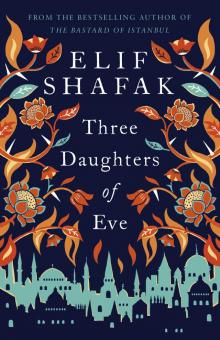 Three Daughters of Eve
Three Daughters of Eve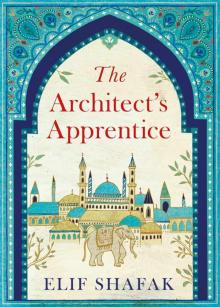 The Architect's Apprentice
The Architect's Apprentice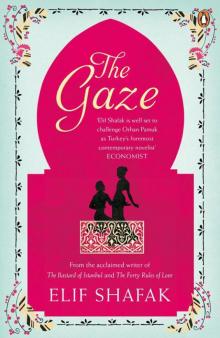 The Gaze
The Gaze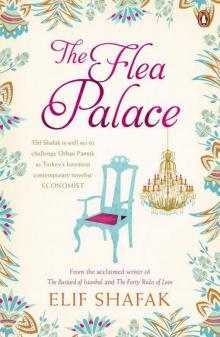 The Flea Palace
The Flea Palace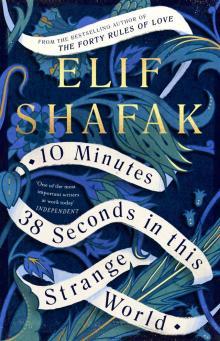 10 Minutes 38 Seconds in this Strange World
10 Minutes 38 Seconds in this Strange World The Forty Rules of Love
The Forty Rules of Love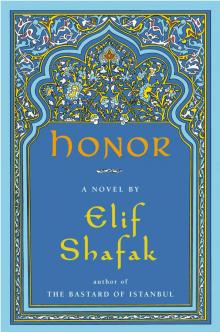 Honor
Honor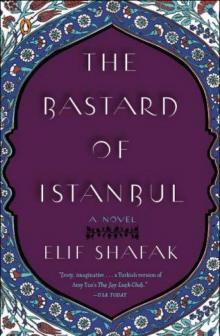 The Bastard of Istanbul
The Bastard of Istanbul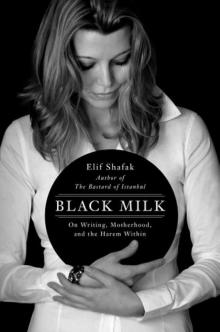 Black Milk
Black Milk The Happiness of Blond People (Penguin Specials)
The Happiness of Blond People (Penguin Specials)